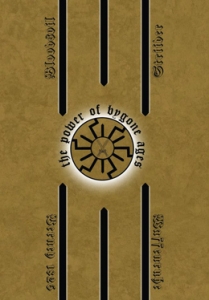
In quite an impressive series of majestic albums, Germany’s Castellum Stoufenburc release a fantastic four-way split, consisting of (new) hymns by all projects involved (three compositions each), as well as some collaborative compositions. Great Aural Art once again, but the visual aspect is at least as impressive (once again done by Cold Sun Arts). One sad remark, however: the limitation to 200 copies only; as a matter of fact, that’s a sad thing for you, for I have mine ;-) (indeed, undersigned did add a smiley…)…
---------------------------------
The Power Of Bygone Ages opens with three tracks by BloodSoil, a solo-project of Aeon. He used to be in Black Metal outfit Rhûnhule before, and some might know him as well from his blackened anti-human solo-outfit Willpower (are you still active, actually?) as well. A first release under the BloodSoil-moniker, for your info, was called Willpower. But under the BloodSoil-moniker, this Spanish musician does not perform Black Metal of any kind at all, yet stuff that nicely fits, of course, to Castellum Stoufenburc’s roster.
What BloodSoil bring is a bombastic and melodious form of Martial Industrial / Dark Ambient with an enormous glorious approach. This material is mainly based on epic, orchestral keyboard compositions in different levels, including martial percussion (I’d like to call it war march drums) and some spoken words. There is quite some variation within these grotesque compositions, for each single piece has an own story to tell, with its own atmospheres. Opener A New Race sounds more symphonic, Inner Struggle is the most post-apocalyptic one out of three, and Sacred War for sure focuses more on oppressive, yet at the same time also glorious structures. But the inherent variety counts as well ‘within’ each single hymn.
Absolutely top-notch material for every fan of Arditi, Waffenruhe, Toroidh or Triarii.
---------------------------------
Fourth piece is a collaboration in between BloodSoil and Verney 1826, called Funeral March For Europe. This is a pretty short and chilly song, with somewhat desolate piano melodies and, towards the end, Neo-Folk oriented vocals (cf. Blood Axis). For a Castellum Stoufenburc-piece, it sound pretty sad, yet it’s so fine to enjoy such integer tristesse and, at the same time, that extravert glorious attitude.
---------------------------------
The next songs are created by Verney 1826, an outfit by Lionel Verney, one of the main members from Neo-Classical act Schattenspiel. Verney 1826 are actually quite productive as from a couple of years ago. The sound is quite unique (though certainly fitting to this label’s roster), by creating something that takes the best out of different yet strongly related genres: Gothic (the ‘real’ stuff from the earlier nineties, and not the pulp created afterwards to please the empty-headed masses), Neo-Folk, Martial Industrial, Dark Electro (at least drum beat-wise) and Neo-classical. The atmosphere of The Last Farewell Of Guido Faukes and Hades refers to cinematic and poetic sources of inspiration. The third song, by the way, called Blood Reign, was on the label’s compilation 5 Jahre, and especially because of the vocal samples (in German of course), it has a mostly martial spirit.
---------------------------------
Track eight, the title song, is a collaboration of all four projects involved. The Power Of Bygone Ages indeed holds the middle in between all players, but with a focus on the victoriously convinced and bombastic Martial approach. But it is remarkable how such collaboration in between four different musicians can result in such fabulous epic! March on!
---------------------------------
Then come Striider, formed by Dutchman Jornt Elzinga (think: Steuermann, Beutewaffen or Mesektet). Striider appeared on quite a lot of splits in mean time, amongst which one with BloodSoil before, by the way, and this is the most recent one. Striider create the aural essence of war, not by expressing brutality, yet by influencing the listener’s mind with those melodies that haunt, surprise, betray and confuse at the same time.
The essence of Augustus 1914 is based on minimal and repetitive spheres of melodious / monotonous aural hypnosis, while Die Neue Zeit sounds like an eighties Minimal Industrial excerpt, rather nihilistically-noisy than melodious-ambient. But it haunts, believe me, it does… Kracht En Vrijheid (‘power and freedom’) too is of the monotonous kind (and ‘monotony’ has never a negative meaning in my world, unless stated specifically), but the fabulous martial drum patterns and the mesmerizing keyboard lines are truly overwhelming. Striider prove to be the most minimal project on this split.
---------------------------------
10 Days Of Arnhem is a joint (ad)venture of Striider and Waffenruhe. Striking are the vocal samples and, believe it or not, the birds singing. After about one minute, this composition turns into little mechanical-industrial-noisy distortion, but soon after you’ll notice the victorious essence of both projects involved. 10 Days Of Arnhem might be one of the most evolving pieces on this split.
---------------------------------
This split ends with three pieces by Waffenruhe, an outfit by label-owner D.S. aka Soldat D. Other outfits of this guy, to inform you correctly, are e.g. Ruhe, Schwarze Heimat or Himmelsburg (with Bunkergeist / The Final War’s O.Kult, by the way). First this: on January 25th 2015, we (Concreteweb) did upload the review I wrote for Waffenruhe’s album War Rituals; worth checking out!
Anyway, here too we can enjoy three pieces of fabulous ‘Militant Martial Music’ (Open The Gates, The New Dawn and Awake The Old Gods), mixing Martial Industrial with obscure symphonies of post-apocalyptic orchestrations. At the same time, this material sounds asphyxiating and victorious, obscure and enlightening, orchestral and primal, but above all, magisterial. The three compositions are built upon (around) a comparable approach / structure, with a focus on melody, emotion, darkness and self-confidence.
---------------------------------
I think all players on The Power Of Bygone Ages are just splendid, and this goes for their co-operations as well. For more than one hour, this collection of some sonic expression of glory, victory, pride and persuasion pleases the listener’s ear, and mind / spirit, with the best elements the martial current has to offer. Must-have material!!!
